Religion and Soft Power in the South Caucasus: Routledge Studies in Religion and Politics
Editat de Ansgar Jödickeen Limba Engleză Paperback – 12 dec 2019
In the Caucasus region, Georgia, Armenia, Azerbaijan and their powerful neighbours Russia, Turkey, Iran and the EU negotiate their future policies and spheres of influence. This volume explores the role of religion in the South Caucasus to describe and explain how transnational religious relationships intermingle with transnational political relationships. The concept of 'soft power' is the heuristic starting point of this important investigation to define the importance of religion in the region.
Drawing on a three-year project supported by the Swiss National Science Foundation, the book brings together academics from the South Caucasus and across Europe to offer original empirical research and contributions from experienced researchers in political science, history and oriental studies.
This book will be of interest to scholars in the fields of post-Soviet studies, international relations, religious studies and political science.
| Toate formatele și edițiile | Preț | Express |
|---|---|---|
| Paperback (1) | 260.54 lei 6-8 săpt. | |
| Taylor & Francis – 12 dec 2019 | 260.54 lei 6-8 săpt. | |
| Hardback (1) | 1000.27 lei 6-8 săpt. | |
| Taylor & Francis – 10 aug 2017 | 1000.27 lei 6-8 săpt. |
Din seria Routledge Studies in Religion and Politics
-
 Preț: 304.05 lei
Preț: 304.05 lei -
 Preț: 281.87 lei
Preț: 281.87 lei -
 Preț: 287.89 lei
Preț: 287.89 lei - 18%
 Preț: 997.93 lei
Preț: 997.93 lei - 26%
 Preț: 763.97 lei
Preț: 763.97 lei -
 Preț: 356.44 lei
Preț: 356.44 lei - 13%
 Preț: 336.43 lei
Preț: 336.43 lei - 17%
 Preț: 259.98 lei
Preț: 259.98 lei -
 Preț: 386.39 lei
Preț: 386.39 lei -
 Preț: 363.41 lei
Preț: 363.41 lei - 18%
 Preț: 1002.32 lei
Preț: 1002.32 lei -
 Preț: 353.57 lei
Preț: 353.57 lei -
 Preț: 389.66 lei
Preț: 389.66 lei - 43%
 Preț: 214.59 lei
Preț: 214.59 lei -
 Preț: 386.81 lei
Preț: 386.81 lei -
 Preț: 349.74 lei
Preț: 349.74 lei - 17%
 Preț: 259.98 lei
Preț: 259.98 lei - 18%
 Preț: 1114.40 lei
Preț: 1114.40 lei - 14%
 Preț: 336.90 lei
Preț: 336.90 lei -
 Preț: 378.92 lei
Preț: 378.92 lei - 26%
 Preț: 653.27 lei
Preț: 653.27 lei - 18%
 Preț: 1000.27 lei
Preț: 1000.27 lei -
 Preț: 389.38 lei
Preț: 389.38 lei -
 Preț: 391.61 lei
Preț: 391.61 lei -
 Preț: 384.59 lei
Preț: 384.59 lei -
 Preț: 389.11 lei
Preț: 389.11 lei - 19%
 Preț: 255.84 lei
Preț: 255.84 lei -
 Preț: 382.75 lei
Preț: 382.75 lei - 16%
 Preț: 243.53 lei
Preț: 243.53 lei - 26%
 Preț: 763.78 lei
Preț: 763.78 lei - 18%
 Preț: 1058.79 lei
Preț: 1058.79 lei - 26%
 Preț: 820.73 lei
Preț: 820.73 lei
Preț: 260.54 lei
Preț vechi: 311.70 lei
-16% Nou
49.85€ • 52.05$ • 41.26£
Carte tipărită la comandă
Livrare economică 05-19 aprilie
Specificații
ISBN-10: 0367886847
Pagini: 258
Dimensiuni: 156 x 234 mm
Greutate: 0.48 kg
Ediția:1
Editura: Taylor & Francis
Colecția Routledge
Seria Routledge Studies in Religion and Politics
Locul publicării:Oxford, United Kingdom
Public țintă
PostgraduateCuprins
Part I: The Case of Georgia
Chapter 1: Turkish Soft Power Politics in Georgia: Making Sense of Political and Cultural Implications
Chapter 2: Common Faith in Scrutiny: Orthodoxy as Soft Power in Russia-Georgia Relations
Chapter 3: Iran’s Soft Power Policy in Georgia
Part II: The Case of Azerbaijan
Chapter 4: Iranian Soft Power in Azerbaijan—Does Religion Matter?
Chapter 5: Examining Salafism in Azerbaijan: Transnational Connections and Local Context
Chapter 6: Islam and Turkey’s Soft Power in Azerbaijan: the Gülen Movement
Part III: The Case of Armenia
Chapter 7: Religion as a Factor in Kurdish Identity Discourse in Armenia and Turkey
Chapter 8: Iran’s Soft Power Policy in Armenia: Cultural Diplomacy and Religion
Part IV: The EU – Russia Framework
Chapter 9: Face to Face with Conservative Religious Values: Assessing the EU’s Normative Impact in the South Caucasus
Chapter 10: Russia as a Counter-Normative Soft Power: Between Ideology and Policy
Part V: Prospects
Chapter 11: Prospects for Thinking Soft Power beyond Joseph Nye
Notă biografică
Recenzii
"The reader who wants to learn something definite about religion and, soft power, or the South Caucasus is well advised to start making explicit her or his own conceptions of all three - otherwise she or he may get lost in the wealth of information that this book contains."
Evert van der Zweerde (Nijmegen)
Descriere
In the Caucasus region, Georgia, Armenia, Azerbaijan and their powerful neighbours Russia, Turkey, Iran and the EU negotiate their future policies and spheres of influence. This volume explores the role of religion in the South Caucasus to describe and explain how transnational religious relationships intermingle with transnational political relationships. The concept of 'soft power' is the heuristic starting point of this important investigation to define the importance of religion in the region.
Drawing on a three-year project supported by the Swiss National Science Foundation, the book brings together academics from the South Caucasus and across Europe to offer original empirical research and contributions from experienced researchers in political science, history and oriental studies.
This book will be of interest to scholars in the fields of post-Soviet studies, international relations, religious studies and political science.
